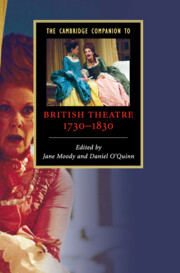Book contents
- Frontmatter
- Part I Performance
- 1 Acting and actors from Garrick to Kean
- 2 Dictating to the empire: performance and theatrical geography in eighteenth-century Britain
- 3 Scenography and technology
- 4 Spectatorship
- Part II Genres
- Part III Identities
- Part IV Places of Performance
- Part V Further Reading
- Bibliography
- Index
- Series list
4 - Spectatorship
from Part I - Performance
Published online by Cambridge University Press: 28 May 2009
- Frontmatter
- Part I Performance
- 1 Acting and actors from Garrick to Kean
- 2 Dictating to the empire: performance and theatrical geography in eighteenth-century Britain
- 3 Scenography and technology
- 4 Spectatorship
- Part II Genres
- Part III Identities
- Part IV Places of Performance
- Part V Further Reading
- Bibliography
- Index
- Series list
Summary
The nature of theatrical spectatorship during the eighteenth and early nineteenth centuries was determined by a number of factors. After the Restoration, the democratisation of the theatre accelerated, the realms of box, pit and gallery accommodating and rendering visible different sectors of the community according to class and income. In general the social range of spectators attracted to the eighteenth-century patent theatres was very wide, while in the early nineteenth century the distribution of audiences became rather more variegated. The size of theatres also increased in this period: by the 1790s, both Drury Lane and Covent Garden Theatre could seat in excess of 3,000 spectators.
Audiences comprised a cross section of society: the more aristocratic, fashionable and affluent patrons in the boxes; intellectuals, less affluent gentlemen and professionals in the pit; tradesmen and their wives in the middle gallery and servants, footmen and sailors among the inhabitants of the upper gallery. At the patent theatres, royal command performances, attended by the reigning monarch and members of the royal family, regularly took place. As John O'Brien has observed, audiences went to the theatre not only to see a play but with the expectation of seeing their collective gathering as 'an image of the nation . . .an ideal “mimic state” that resembled the political state not only in its frequent dramaturgical focus on dynastic affairs but in its material form.'
Once we consider the constitution of audiences in the minor theatres which flourished in the expanding suburbs of London and the newer industrial cities from the late eighteenth century onwards, patterns of spectator attendance and composition become more complicated.
- Type
- Chapter
- Information
- The Cambridge Companion to British Theatre, 1730–1830 , pp. 57 - 70Publisher: Cambridge University PressPrint publication year: 2007
- 4
- Cited by



